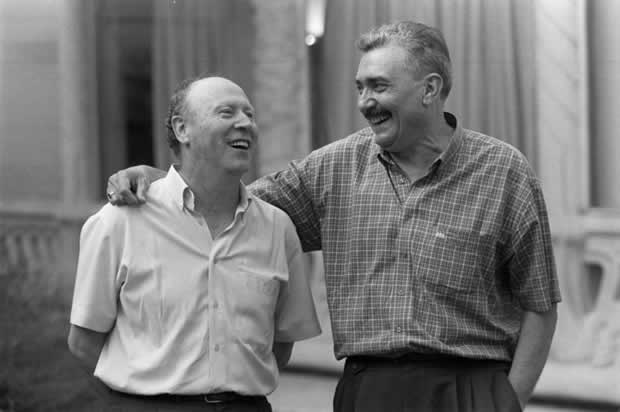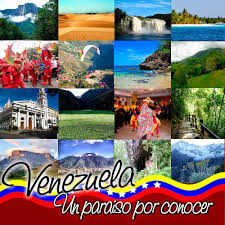This time I bring you a song that for us Venezuelans has become another hymn after the Alma Llanera. Venezuela is a beautiful song that has been planted in the heart and soul of all Venezuelans. Its lyrics and music are extraordinary. It is truly unparalleled, its message is already part and subject of study in our schools as mandatory as playing the Cuatro. Singing this song motivates us to love our country much more. I hope you like my version.
Translated with www.DeepL.com/Translator (free version)
JOSÉ LUIS ARMENTEROS
He was part of the group Los Relámpagos (1965), as guitarist. He was artistic director of the Philips record company. Three years later, together with the also Spanish composer and producer Pablo Herrero Ibarz, he dedicated himself to the production and composition for other artists from Spain, Panama and Venezuela, including "Un beso y una flor" (1972), "Libre" (1972), "América, América" (1973) interpreted by Nino Bravo, stage name of the Spanish singer Luis Manuel Ferri Llopis (1944-73); "La estrella de David" (1973), interpreted by Juan Bau, stage name of the Spanish singer Juan Bautista Conca Moya (1948); "Tengo tu amor" (1968), "Cuéntame" (1968), "Cenicienta" (1969) "Eva María" (1972), "La fiesta de Blas" (1974) performed by the Spanish musical group Fórmula V (1967-75), formed by the singer and the Spanish musicians Francisco de Asís Pastor, stage name of singer Paco Pastor (1948) vocal leader, drummer Antonio Sevilla, bassist Mariano Sanz, guitarists José Villar and Joaquín de la Peña, then when Villar left the group he was replaced by Amador Flores; "Libertad sin ira" (1976) performed by the Spanish musical group Jarcha (1972-present), integrated by the Spanish singers Maribel Martín (1954), Lola Bon, Antonio A. Ligero, Ángel Corpa, Crisanto Martín, Gabriel Travé and Rafael Castizo; "Como una ola" (1981) performed by Spanish singer Rocío Jurado (1944-2006); "Latino"(1981) performed by Francisco, stage name of Spanish singer Francisco González Sarriá (1959); "Tierras lejanas" (1971) performed by Basilio, stage name of Panamanian singer Basilio Antonio Fergus Alexander (1947-2009); "Venezuela" (1980) interpreted by the aragüeño singer Balbino, artistic name of Balbino González Pérez (1951); and "Atrévete"(1980), "Me vas a echar de menos" (1980), "Siempre acabo por llorar" (1980); "Adivina de dónde soy", " Amar es algo más" (1980), "interpreted by the Caracas singer and tv actor José Luis Rodríguez "El Puma" (1943).
Translated with www.DeepL.com/Translator (free version)
Spanish musician and composer José Luis Armenteros passed away in Madrid, Spain on June 11, 2016.
source
I carry your light and your scent on my skin
And the cuatro in my heart
I carry in my blood the foam of the sea
And your horizon in my eyes
I do not envy the flight nor the nest to the turpial
I am like the wind in the harvest
I feel the Caribbean like a woman
I am like this, what am I going to do?
I'm desert, jungle, snow and volcano
And as I walk, I leave a trail
Of the rumor of the plain in a song
That keeps me awake
The woman I love has to be
Heart, fire and spur
With skin toasted like a flower
Of Venezuela
With your landscape and my dreams I'll go
Through those worlds of God
And your memories at sunset
Will make the road shorter for me
Among your beaches, my childhood was left
Stretched out to the wind and the sun
And that nostalgia that rises in my voice
Unintentionally became a song
Of the mountains, I want the immensity
And of the river, the watercolor
And from you, the children that will sow
New stars
And if one day I have to be shipwrecked
And the typhoon breaks my sails
Bury my body near the sea
In Venezuela...source

source
Translated with www.DeepL.com/Translator (free version)
JOSÉ LUIS ARMENTEROS
En relación al tema “Venezuela”, se dice que originalmente fue escrito para que lo interpretara por José Luis Rodríguez para el álbum Atrévete (1980), pero no se incluyó en el mismo, y finalmente lo grabó el cantante aragüeño Balbino González. Esta hermosa canción es considerada como himno oficioso (no oficial) de Venezuela, luego del Alma llanera (1914), tema que nació como una zarzuela y se convirtió en joropo, compuesta por el periodista y escritor aragüeño Rafael Bolívar Coronado (1884-24) y música del compositor guaireño Pedro Elías Gutierrez (1870-1954). Nuestro Himno Nacional, es el Gloria al Bravo Pueblo, compuesto en el año 1810 por el periodista, médico y escritor caraqueño Vicente Salias (1776-1814) y el compositor caraqueño Juan José Landaeta (1780-1812(4)), que fue establecido como Himno Oficial el 25 de mayo de 1881 por el Presidente caraqueño, militar y abogado Antonio Guzmán Blanco (1829-99).
El músico y compositor español José Luis Armenteros falleció en Madrid, España el 11 de junio de 2016.
fuente
Llevo tu luz y tu aroma en mi piel
Y el cuatro en el corazón
Llevo en mi sangre la espuma del mar
Y tu horizonte en mis ojos
No envidio el vuelo ni el nido al turpial
Soy como el viento en la mies
Siento el Caribe como a una mujer
Soy así, ¿qué voy a hacer?
Soy desierto, selva, nieve y volcán
Y al andar, dejo una estela
Del rumor del llano en una canción
Que me desvela
La mujer que quiero tiene que ser
Corazón, fuego y espuela
Con la piel tostada como una flor
De Venezuela
Con tus paisaje y mis sueños me iré
Por esos mundos de Dios
Y tus recuerdos al atardecer
Me harán más corto el camino
Entre tus playas, quedó mi niñez
Tendida al viento y al Sol
Y esa nostalgia que sube a mi voz
Sin querer se hizo canción
De los montes, quiero la inmensidad
Y del río, la acuarela
Y de ti, los hijos que sembrarán
Nuevas estrellas
Y si un día tengo que naufragar
Y el tifón rompe mis velas
Enterrad mi cuerpo cerca del mar
En Venezuela...fuente

fuente
El video fue grabado desde un celular marca HUAWEI. 4G

